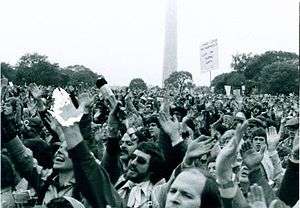Washington for Jesus
Washington for Jesus was a series of demonstrations held in Washington, D.C. by various representatives of the Christian right in the United States. The first rally was held in 1980 on 29 and 30 April and centered primarily on promoting a conservative religious viewpoint in the political arena. Religious leaders present included Pat Robertson, Jerry Falwell, William Bright, and Benson Idahosa.
| Washington for Jesus | |
|---|---|
 Washington For Jesus, Washington D.C., April 29, 1980 | |
| Location | Washington, D.C. |
| Caused by | Religion and politics |
| Goals | Hope, change |
| Methods | Rally, speeches |
Although the event was ostensibly non-political,[1] speeches and statements during the 1980 rally outlined many of the early points of the socially conservative agenda of the religious right. It was during this time that many national leaders of the Christian right unified in their political stances against homosexuality, abortion, teenage pregnancy, drug abuse, increasing divorce rates, and the women's liberation movement. The event is regarded as a forerunner of the rise of political activism among conservative Christians,[2] and the rallies are believed to have helped mobilize the religious right behind the candidacies of Ronald Reagan and George W. Bush.[3]
History and rallies
Washington for Jesus was founded by John Gimenez, the pastor of Rock Church in Virginia Beach, Virginia. Gimenez founded One Nation Under God, Inc. because, he said, he received prophecies that he should go to Washington to influence the future of the United States. Although Gimenez was essentially Charismatic in his beliefs, he was able to appeal to a larger segment of the Christian community with the help of his friend Pat Robertson, who was also based in the Virginia Beach area.
Independent estimates of attendance at the 1980 rally range from 125,000 to 200,000, while Robertson said the attendance was closer to 500,000.[1][4][5][6][7] The Washington Metropolitan Area Transit Authority estimated that 400,000 trips were taken on the day of the event, which was a single day record, and the first time the system topped 400,000.[8] This broke the record set on 2/26/1980. The record would last more than a year and a half until the pro-union Solidarity Day March.
While Bright argued that the participants had "not come to Washington with a political agenda or to lobby for certain legislation", speakers at the event were explicitly critical of Supreme Court decisions and warned that the increasing acceptance of abortion and homosexuality would provoke God's retaliation in the form of an attack by the Soviet Union.[9] A group of 20 prominent religious organizations, including the National Council of Churches, criticized the Washington for Jesus rally as explicitly political and an effort to "Christianize the government".[1]
During the 1988 rally, President Ronald Reagan addressed the crowd via videotape, describing his plan to make the following Thursday a National Day of Prayer. The National Park Service estimated the crowd at 200,000. The 1988 rally also helped set a single day record for Metrorail, with an estimated 565,000 trips on the day of the rally, breaking the record set by the Redskins Super Bowl victory parade two months earlier. The record would last until the Inauguration of George H.W. Bush in 1989.[10]
The 1996 rally, held in pouring rain, drew an estimated 75,000 people, according to the U.S. Park Police.[11]
In 2012, Gimenez' widow, Anne, spearheaded a two-day rally in Philadelphia called "America for Jesus."[12]
See also
References
- Associated Press (April 29, 1980). "125,000 Sing, Pray in 'Washington for Jesus' Rally". Eugene Register-Guard. Retrieved October 13, 2011.
- Vegh, Steven G. (February 14, 2008). "Bishop John Gimenez, co-founder of Rock Church, dies". Virginian-Pilot. Retrieved 27 May 2012.
- Posner, Sarah (June 17, 2009). "All Roads Lead to Virginia Beach". The American Prospect. Retrieved 27 May 2012.
- Diamond, Sara (1995). Roads to Dominion: Right-Wing Movements and Political Power in the United States. Guilford Press. pp. 175. ISBN 978-0-89862-864-7.
- Westerlund, David (1996). Questioning the Secular State: The Worldwide Resurgence of Religion in Politics. Hurst Publishers. p. 36. ISBN 978-1-85065-241-0.
- Rojas, Aurelio (October 13, 1995). "A Pilgrimage for Bay Area Blacks". San Francisco Chronicle.
Following are estimates by the National Park Service of attendance at other major demonstrations, rallies and events in the nation's capital: ... Washington For Jesus religious rally, 1980: 200,000
- Associated Press (April 30, 1988). "'WASHINGTON FOR JESUS' RALLY DRAWS CROWD TO CAPITAL". Orlando Sentinel. Retrieved October 13, 2011.
- "Rally-Goers Boost Ridership on Metro". The Washington Post. 1 May 1980.
- Turner, John (2008). Bill Bright & Campus Crusade for Christ: The Renewal of Evangelicalism in Postwar America. UNC Press Books. ISBN 978-0-8078-5873-8.
- Fehr, Stephen C; Jordan, Mary (13 June 1991). "Parade Hands Metro Two Records". The Washington Post.
- ""Washington for Jesus" rally draws 75,000". Southeast Missourian, from wire service reports. May 1, 1996. Retrieved 27 May 2012.
- "Christians to Gather in Philadelphia, Sept. 28-29, to Pray for the Healing of Our Country". Christian NewsWire. February 20, 2012. Retrieved 27 May 2012.
External links
- "Washington For Jesus Rally", featuring Rev. Falwell. C-SPAN video, 33:00 min, April 29, 1996.